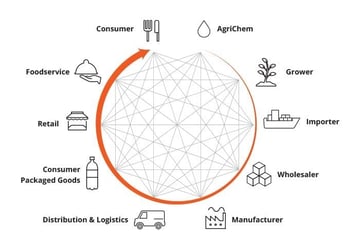The Food Safety Modernization Act addresses many issues in the food processing supply chain from "farm-to-fork." One major goal is to reduce the number of illnesses that result from failures in the supply chain. Data from the Centers for Disease Control suggest that there are approximately 50 million cases of foodborne illness in the United States every year. More than 100,000 hospitalizations result, and several thousand people die.
Digitizing Supply Chains
The U.S. Food and Drug Administration sums up the problem thusly: “This is a significant public health burden that is largely preventable.” Within this context Congress passed the Food Safety Modernization Act (FSMA). FSMA expands the role of the FDA in requesting records and auditing companies. In more extreme situations, it gives the FDA the power to shut down plants - a shift from reactive enforcement to proactive enforcement.
Since Congress passed the new legislation, food suppliers have been focused on successful implementation of FSMA with software.
FSMA addresses four key areas:
-
Inspection and compliance
-
Preventative controls
-
Imported food safety
-
Improved partnerships and enhanced response
In an effort to reduce incidents of food contamination and food-borne illnesses, FSMA requires implementation of additional preventative controls across food supply chains.
FSMA and Supply Chain Collaboration
New FSMA rules address everything from farm-to-fork. Compliance may be daunting for many suppliers, but meeting requirements offers tangible rewards that set a company up for future success. In fact, everyone in the supply chain benefits from the full transparency that is only possible with substantial collaboration. Some have dubbed it the “race to trace” - to track every element of the journey from production to retail delivery.
A lack of transparency often lies at the root of process failures that raise FSMA compliance concerns. Therefore, a complete audit of the entire process will expose current vulnerabilities, whether they be in preparation, packaging or transportation. In a worst case scenario, a process breakdown may result in the FDA exercising its new FSMA mandatory recall powers.
On the other hand, a truly integrated, transparent supply chain offers day-to-day efficiency that makes participants more competitive. It also gives companies the agility to quickly respond when a recall or other issue arises, from pulling product to producing documentation.
Advantages of Certifications
For some, the road to FSMA compliance is enhanced by obtaining certification through the Safe Quality Food (SQL) program or the Global Food Safety Initiative (GFSI). These non-mandated programs are essentially based upon the same rules as FSMA. Therefore, they provide a useful means of self-policing. SQL documentation requirements are similar to those of FSMA, so an SQL-certified food manufacturer is well on the road to FSMA compliance in most instances. Obtaining an SQF Certification is a relatively straightforward process.
SQL and GFSI certifications enhance one's brand in the eyes of both industry insiders and customers. Any initiative representing real dedication to food safety enhances one's brand.
Recall Management
Greater testing across the supply chain increases the potential for identifying problems that require recalls. For example, developing the capacity to identify allergens and impurities specifically by lot code, not just by the date of processing, is the ideal solution. Knowing the origin of every ingredient can limit the magnitude of a recall when a problem arises.
Goals and Strategy
In many instances, a transition to a fully digital approach offers an opportunity for compliance success through:
-
Identifying risks faster and more efficiently
-
Preventing failures through training, testing and communication
-
Developing rapid response capabilities
Is it possible to make your food manufacturing process absolutely foolproof with a fully digital approach? No system can offer that guarantee, but it can mitigate the risks and losses associated with failures. As FSMA enforcement unfolds in 2017, any enterprise aggressively adopting a proactive approach to compliance will be rewarded with long-term competitive advantages.
Millions of Pounds Seized
Expanded FDA powers include:
-
New mandatory recall authority
-
Authority to suspend a food processing facility’s registration
-
Retain products which may violate the law through added administrative powers
A recent case illustrate the FDA's power in non-compliant situations:
Valley Milk Products, LLC, is the cooperative that processes milk for more than 1,500 dairy operations in both the Mid-Atlantic and Southeastern parts of the United States.
Last September, visiting FDA inspectors looked at the cooperative’s records. They discovered that certain product samples and internal environments had tested positive for salmonella meleagridis. The inspectors also discovered that residue and condensation had dripped from a ceiling fan to processing equipment below.
The FDA went to the Department of Justice (DOJ), which filed a legal request with the U.S. District Court for Western Virginia. A federal judge granted the request and ordered the seizure at a plant in Strasburg, Virginia.
On Wednesday, November 30, 2016, U.S. Marshalls entered the Virginia milk processing facility, and they seized 4 million pounds of dry buttermilk and non-fat milk packaged in 40 and 50-lb bags. The legal action shut down a facility with a dry milk production capacity of 200 million pounds per year. Such court actions, although uncommon, illustrate the power of the FDA to seize tainted food products. A single incident of this magnitude impacts the reputation and profitability of an organization for months or years to come.
Farm to Fork: Digitizing the Journey
With the right food ERP platform, it is possible to trace activity in the supply chain both forward and backward. FoodLogiQ Connect automates processes for an unmatched combination of speed and accuracy. Once the system is in place, a thriving company can enjoy new levels of productivity, compliance and risk reduction.
FoodLogiQ partners with its customers to create a safer and more transparent food supply chain consistent with FSMA mandates.
Other posts you might be interested in
View All Posts
Supplier Compliance
8 min read
| May 31, 2018
In Wake of Romaine Lettuce Recall, FoodLogiQ Shares Thoughts on the Importance of Supply Chain Management and Food Traceability
Read More
Supplier Compliance
7 min read
| May 8, 2018
Response Time is Key When it Comes to Mitigating Risks Along the Supply Chain
Read More
Supplier Compliance
4 min read
| May 15, 2019

